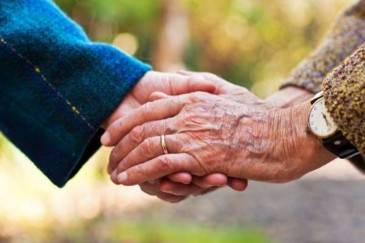 In our discussion of wound care among the elderly population, we will primarily be looking at ulcer care; specifically, the improper care of ulcers. Given that the integrity of the skin tends to degenerate as we age, and that certain diseases like diabetes compromise skin integrity even more, the elderly population is much more at risk of developing ulcers and other chronic wounds. In fact, according to some reports, as many as 70% of all pressure ulcer cases occur among the elderly population. In itself, this is troubling; however, it’s even more concerning when these wounds are not properly tended to and cared for, as it puts the patients at considerable risk of infection or life-threatening health issues.
In our discussion of wound care among the elderly population, we will primarily be looking at ulcer care; specifically, the improper care of ulcers. Given that the integrity of the skin tends to degenerate as we age, and that certain diseases like diabetes compromise skin integrity even more, the elderly population is much more at risk of developing ulcers and other chronic wounds. In fact, according to some reports, as many as 70% of all pressure ulcer cases occur among the elderly population. In itself, this is troubling; however, it’s even more concerning when these wounds are not properly tended to and cared for, as it puts the patients at considerable risk of infection or life-threatening health issues.Expectations When Caring for Chronic Wounds
When treating ulcers and other chronic wounds, there are four stages of healing: coagulation, inflammation, proliferation, and maturation. Nurses and care providers must be aware of the complications that can arise at each of these stages so they can effectively treat them among patients who suffer. For example, most chronic wounds get stuck in the inflammatory phase, which means medical professionals and caregivers need to be particularly vigilant in their treatment during this stage; failure to do is a failure to protect against the patients’ inability to progress in their healing.
According to a study published in the U.S. National Library of Medicine, National Institutes of Health, the three major considerations when treating chronic wounds like ulcers are:
- Bacterial balance: Some bacteria in a wound is normal; however, when the amount of bacteria indicates overgrowth and/or infection, it can significantly impair a patient’s ability to heal. Caregivers who ignore signs of bacterial imbalance should be held responsible for the negative consequences their patients suffer as a result. These signs include: pus secretions from the wound, bleeding from the wound, odor from the wound, increased temperature around the wound.
- Necrotic tissue: When necrotic tissue appears, it inhibits the wound from developing granulation tissue and it increases the likelihood of bacterial overgrowth. To prevent necrotic tissue, caregivers must check the patient’s would for adequate blood supply; failure to identity warning signs connected to the patient’s pulse and capillary refill time could lead to serious problems for the patient.
- Moisture balance: While moisture has proven effective in accelerating a wound’s healing, too much moisture and/or drainage can actually damage the surrounding tissue and lead to maceration. Signs of maceration include: wrinkly skin that’s lighter in color; skin that feels soft to the touch, or even wet and soggy. Moisture balance is particularly important when treating wounds with dressings, as many dressings can increase moisture and potentially compromise the healing process. As such, caregivers are expected to closely monitor the effects of the dressings they use on patients.
Other factors among the elderly that could complicate wound care include:
- Dead skin, or necrosis, that hinders the body’s ability to heal the wound.
- Immobility that leads to friction or pressure, which can exacerbate the wound.
- Poor diet that lacks the proper nutrients (zinc, Vitamin C, etc.) to facilitate healing.
If all, or even one, of these areas is not properly addressed, the patient will likely experience serious difficulties in the healing process.
What You Can Do to Help
Sadly, too many of geriatric patients in nursing homes do not get the medical care and attention they need to remain healthy. These facilities are often understaffed, and the caregivers who are hired do not always have the proper medical backgrounds needed to properly tend to an elderly population of patients.
If your elderly loved one is suffering from improper wound care, you have every right to take legal action. Doing so can help ensure your loved one gets the care they need AND can ensure the facility and/or care providers are prevented from engaging in the same negligent treatment that led to your loved one’s illness or injury in the first place.
Take action now by contacting Christian & Christian for help. We can be reached via our online contact form or by dialing (864) 408-8883.
